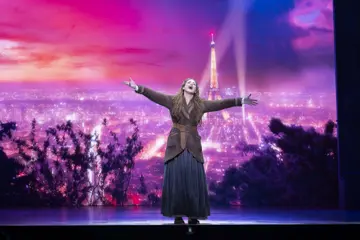When millionaire family man Herman Rockefeller was killed the case sparked a lot of public interest – for one, it was not so much Rockefeller that was killed as it was his swinger alternate personality, Andy Kingston, a pseudonym used for extramarital sex. It was not a case of split personality, or a psychological condition, this was (hardly) simply a man leading two concurrent, and very different lives.
“What I wanted to look at was the way that power and entitlement operate in our society,” explains Duncan Graham, who penned Dreams In White. “And the Rockefeller story opened a window for me – what interested me was that there was a man who was living two lives that could not be reconciled and actually I don't think he ever thought they needed to be reconciled. And I thought, 'Well, we can now live so many different identities and each one can be satisfying a different part of you, or a different desire, and why is [it] that we can't have them all inside one identity?'”
What this question boils down to, what lies at the heart of the modern quest for privacy, says Graham, is a shocking blow to what we perceive to be authentic. “The play itself raises the question about 'what is authenticity?' because the play also deals with the problem of identity and how the public and the private self are also tied up in the problem. What I've found working in this story is that it really does connect to ideas of power and entitlement. We live in a society in which everybody… At the point that they do something, or a politician says something, it immediately becomes an image, and the image has public currency – online, facebook, all these things – but then we start to gather images and views of people. It connects to things like Tony Abbott or Julia Gillard's personalities now, so we're examining their private lives.” Graham makes mention of the use of interviews with Abbott's wife to reveal the 'private' Abbott.
“So the lines, everywhere you go from the top to the bottom, are all blurred and it raises the question, 'Where does anybody find their privacy now, their true privacy?' And maybe the question that the play asks is, 'Is it now that we have to create other, more secret identities to preserve any sense of privacy in the world?'”
Don't miss a beat with our FREE daily newsletter
Graham has described his playwriting process as the untangling of a knot, and in wrestling with the rope that is Dreams In White he discovered these questions have resonance not only in the political sphere, but also, perhaps more concerning the personal. “The play shows human beings dealing with that society of spectacle and, particularly the younger character in the play, how she is trying to reconcile love in that type of world; so how do you know what love is and how can you achieve it in those difficult circumstances in which everything becomes an image?”
WHAT: Dreams In White
WHEN & WHERE: Friday 8 February to Saturday 23 March - Griffin SBW Stables Theatre, Darlinghurst NSW















